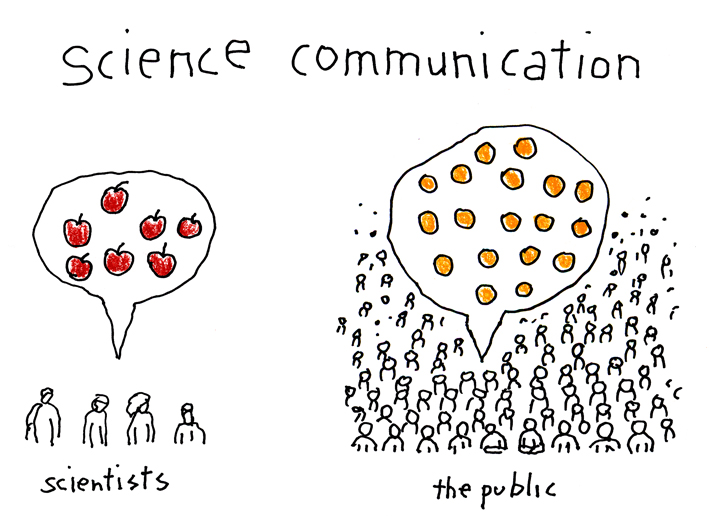
(Cartoon by Tom Dunne)
I recently participated as a member of a search committee, with a focus on hiring a new Social Scientist. As this was my first search committee, I made sure to take an incredible volume of notes, as I knew that my position and training as a "Natural Scientist" undoubtedly gives me certain biases (even if unconscious). I tried to copy responses verbatim as best I could. I knew that in many ways, I would defer to the expertise of the other Social Scientists on the committee, but for the sake of scientific and interdisciplinary diversity, I was happy to serve on this committee, especially given the desire to hire colleagues eager to work across disciplines. During many of these interviews, as other members of the committee nodded along to the respective interviewee's responses, seemingly following along with full comprehension, I found that I was constantly asking myself questions like,
"So what does that actually mean?"
"What does that actually look like in practice"
"What is the research trying to solve or predict?"
"What are you actually trying to say here?"
...And to be honest. I felt terrible about it. Clearly, I just didn't understand. I'd often look down at my written notes, sometimes comprised of paragraphs of text, and scratching my head thinking....."That's a lot of words....but I don't really understand what is being said". Clearly, the other search committee members are following along acutely (so I am in the minority), but it really made me realize again, just how important the concepts of Science Communication are. Social Scientists (and Anthropologists for that matter) undoubtedly carry out important and relevant research. They look at questions of human behavior and interactions, and the interplay across many disciplines (including the "natural" or "environmental" sciences). To someone not intimately familiar with that type of research, it can seem very nebulous though. And this of course works the other way as well. I imagine if a social scientist were to attend one of my talks or poster presentations on glaciological processes in West Antarctica, they'd be asking just as many questions. The truth is, with all of the training that goes in to advanced graduate degrees, it can be easy to form a strong foundation and understanding for our respective methods, structures, and processes. And despite efforts to branch out and be more interdisciplinary, it can be really hard to think outside of our proverbial boxes.
This entire process has really reignited a spark within me to focus more on interdisciplinary science communication. I need to work with others across fields to not only find ways to better communicate the science that I prioritize, but to better understand just how other fields are going after the questions that scientists like me are unable, and unqualified to answer. It also makes me realize that I need to continue to strive to be more open minded, and more receptive to science concepts outside my scientific literacy and familiarity.
As a fun way to end this post, I thought I'd share results from a silly experiment. One of the questions that our search committee asked interviewees, was essentially "What makes you a good fit for this position?". I compiled all of my written notes in an effort to get a sense of the "word clouds" and specific mention counts of certain concepts or words (and again, my notes were essentially verbatim responses from candidates). One approach I took, was to upload my notes into a machine learning algorithm to see what it would spit out. What I didn't realize though, is this particular engine actually creates new text based on the inputs you provide. It essentially creates its own version of your text as though it is an actual person talking to you (almost as if it were a crude Turing Test). Based on the results, it illustrates that there is nuance to the responses that I clearly wasn't getting. My notes were obviously packed with "buzz" words and phrases. This also explains why I was asking myself questions like, "What are you actually trying to say here?", as the AI text results contains over 150 words, but yet doesn't really say anything truly substantial or substantive. It's essentially just empty words. Again, this speaks volumes to my true lack of understanding of the actual science. Still, I thought the results were somewhat amusing....
So...what makes you a good fit for this position?.....
"I like to think that I work at the nexus of multiple disciplines, but also across boundaries. I have a passion for interdisciplinary work that bridges gaps and deconstructs silos. I also leverage my strengths, understanding what I am, and what I am not. When working through my research or designing a project, I employ methodologies centered on co-production of knowledge, and strive to augment community assets and maximize the potential of human and social capital. I focus on community engagement, evaluate multi-dimensional resilience, and prioritize just transitions. It is important to build a scaffolding when working across cultural boundaries and marginalized communities. My research methodology involves merging qualitative and quantitative approaches, and using broad frameworks, while also incorporating focus groups; I really like to understand where breakdowns occur. It is also critical to identify key stakeholders, and establish strong foundations. It is about working across research paradigms, and more simply, facilitating conversations."
....Wait...what??